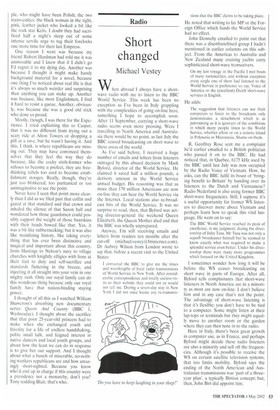Radio
Short changed
Michael Vestey
When abroad I always have a shortwave radio with me to listen to the BBC World Service. This week has been no exception as I've been in Italy grappling with the complexities of going on-line here. something I hope to accomplish soon. After 11 September, carrying a short-wave radio seems even more pressing. Were I travelling to North America and Australasia there would be no point, as last July the BBC ceased broadcasting on short wave to these areas of the world.
As I've said before, I received a huge number of emails and letters from listeners outraged by this absurd decision by Mark Byford, director of the World Service. He claimed it saved half a million pounds, a derisory amount in the World Service annual budget. His reasoning was that as more than 170 million Americans are now on-line they can hear the World Service via the Internet. Local stations also re-broadcast bits of the World Service. It was no surprise to read, then, that Byford was acting director-general the weekend Queen Elizabeth, the Queen Mother died and that the BBC was wholly unprepared.
Anyway, I'm still receiving emails and letters from readers ten months after the cut-off (michael.vestey@,,btinternet.com). Dr Aubrey Wilson from London wrote to say that, before a recent visit to the United States:
I contacted the BBC to give me the times and wavelengths of local radio transmissions of World Service in New York. After considerable correspondence and totally useless visits to their website they could not or would not tell me. During a seven-day stay in New York I did not once locate any re-transmis
sions that the BBC claims to be taking place.
He noted that writing to his MP or the Foreign Office which funds the World Service had no effect.
John Dennehy emailed to point out that there was a disenfranchised group I hadn't mentioned in earlier columns on this subject. From the Americas to Australia and New Zealand many cruising yachts carry sophisticated short-wave transceivers.
On my last voyage in the Pacific I met boats of many nationalities, and without exception every single one of them had listened to the World Service in preference to, say, Voice of America or the (excellent) Dutch short-wave services in English.
He adds:
The suggestion that listeners can use their computers to listen to the broadcasts only demonstrates a detachment which is as patronising as it is ignorant of the conditions in which many people listen to the World Service, whether afloat or on a remote island in Polynesia or Micronesia. Shame on them.
R. Geoffrey Rose sent me a complaint he'd earlier emailed to a British politician who passed it on to the BBC. He had noticed that, in Quebec. 6175 kHz used by the BBC until last July was now occupied by the Radio Voice of Vietnam. How, he asks, can the BBC fulfil its boast of 'bringing benefit to Britain' by handing over its listeners to the Dutch and Vietnamese? Radio Nederland is also using former BBC short-wave frequencies. Still. I suppose it's a useful opportunity for former WS listeners to discover more about Vietnam and perhaps learn how to speak this vital language. He went on to say: The BBC World Service reached its peak of excellence, in my judgment, during the directorship of John Tusa. Mr Tusa was not only a superb broadcaster himself but he seemed to know exactly what was required to make a splendid service even better. Under his directorship there were many more programmes which focused on the United Kingdom.
I sometimes wonder how long it will be before the WS ceases broadcasting on short wave in parts of Europe. After all, Byford tells complainants that short-wave listeners in North America are in a minority as most are now on-line. I don't believe him and in any case that's not the point. The advantage of short-wave listening is that it's flexible; you don't have to be tied to a computer. Some might listen at their lap-tops or terminals but they might equally move to another room or the garden where they can then tune in to the radio.
Here in Italy, there's been great growth in computer use, as in France, and perhaps Byford might decide these radio listeners are also a minority and sell off the frequencies. Although it's possible to receive the WS on certain satellite television systems, that too limits mobility. Byford says the ending of the North American and Australasian transmissions was 'part of a threeyear plan', a typically Birtian concept; but, then, John Birt did appoint him.






































































 Previous page
Previous page